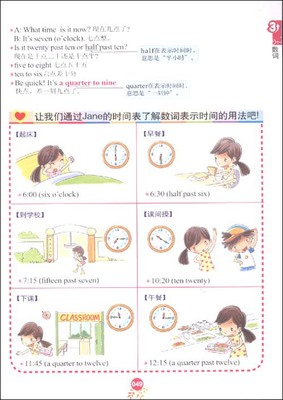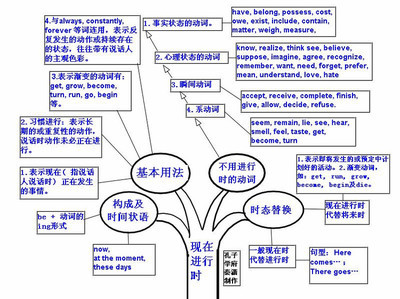1) 祈使句有两种类型,一种是以动词原形开头,在动词原形之前加do (但只限于省略第二人称主语的句子)。
Take this seat.
Do be careful.
否定结构:
Don't move.
Don't be late.
2) 第二种祈使句以let开头。
Let 的反意疑问句
a. Let's 包括说话者
Let's have another try,shall we / shan't we?
= Shall we have another try?
b. Let us 不包括说话者
Let us have another try,will you / won't you?
= Will you please let us have another try?
否定结构:
Let's not talk of that matter.
Let us not talk of that matter.
13.2 感叹句结构
感叹句通常有what, how引导,表示赞美、惊叹、喜 悦、等感情。
what修饰名词,how 修饰形容词,副词或动词,感叹句结构主要有以下几种:
掌握它的搭配,即掌握了感叹句的重点。
How +形容词+ a +名词+ 陈述语序
How+形容词或副词+ 陈述语序
What +名词+ 陈述语序
What+a+形容词+名词+ 陈述语序
What+ 形容词+复数名词+ 陈述语序
What+ 形容词+不可数名词+ 陈述语序
How clever a boy he is!
How lovely the baby is!
What noise they are making!
What a clever boy he is!
What wonderful ideas (we have)!
What cold weather it is!
感叹句的省略形式为:
What a clever boy (he is)!
典型例题
1)___ food you've cooked!
A. How a nice B. What a nice C. How nice D. What nice
答案D. 由于How 修饰形容词,副词;what修饰名词。且food为不可数名词,因此A,B 排除。C How + adj.后面不能再加名词,因此只有D正确,其句型为What + adj. +n. (不可数)
2)___terrible weather we've been having these days!
A. What B. What a C. How D. How a
答案A. weather为不可数名词,B,D排除。C为how + adj. 后面不应有名词。只有A,符合句型What+形容词+不可数名词。
3) --- _____ I had!
--- You really suffered a lot.
A. What a time B. What time C. How a time D. how time
答案A. 感叹句分两类:
1:What + n.+主谓部分
2:How + adj. / adv. / v.+主谓部分。本题属第一种,但省略了bad,相对于 What a badtime I had! 这是个习惯用语。
13.3 强调句结构
常考的强调句结构是it 引导的句子。
It is (was) 被强调部分+ that (who) + 句子其他部分。
此结构强调的成分仅限于主语,宾语和状语。
It is from the sun that we get light and heat.
It was not until I had read your letter that I understood thetrue state of affairs.
典型例题
1) It was last night ___ I see the comet.
A. the time B. when C. that D. which
答案C. 强调句的结构是: It +be +强调部分 + that (who) +主谓句。 强调句的连词只有两个,that和who。当强调的部分是人,且为句子的主语时,才用 "who",其余用that。
原句: My father did the experiment in the lab yesterdayevening.
强调主语: It was my father who did the experiment in the lab yesterdayevening.
强调宾语: It was the experiment that my father did in the labyesterday evening.
强调时间: It was yesterday evening that my father did the experimentin the lab. (注意不用when)
强调地点: It was in the lab that my father did the experimentyesterday evening.
2)It is ten years ___ Miss Green returned to Canada.
A. that B. when C. since D. as
答案C. 考点是连词用法。 本题易误选为A. that. 其实本句不是强调句。若是,去掉It be…that还应是一个完整的句子。而本句去掉 'It is…that',只剩下ten years Miss Green returnedto Canada. 不成句。因此本句不是强调句。
It is /was +时间+ since… 其中is<--->has been was <---> had been.
13.4 用助动词进行强调
强调句还有一种类型,就是用助动词do (did,does) 强调谓语。
She does like this horse. 她的确喜欢这匹马。
Please do take care of yourself. 千万保重。
13.5 反意疑问句
1) 陈述部分的主语是I,疑问部分要用 aren't I.
I'm as tall as your sister,aren't I?
2) 陈述部分的谓语是wish,疑问部分要用may +主语。
I wish to have a word with you, may I?
3) 陈述部分用 no, nothing, nobody, never, few, seldom, hardly, rarely,little等否定含义的词时,疑问部分用肯定含义。
The Swede made no answer, did he / she?
Some plants never blown (开花), do they ?
4) 含有ought to 的反意疑问句,陈述部分是肯定的,疑问部分用shouldn't / oughtn't +主语。
He ought to know what to do, oughtn't he? / shouldn't he?
5) 陈述部分有have to +v. (had to + v.),疑问部分常用don't +主语(didn't+主语)。
We have to get there at eight tomorrow, don't we?
6) 陈述部分的谓语是used to 时,疑问部分用didn't +主语或 usedn't +主语。
He used to take pictures there, didn't he? / usedn't he?
7) 陈述部分有had better + v. 疑问句部分用hadn't you?
You'd better read it by yourself, hadn't you?
8) 陈述部分有would rather +v.,疑问部分多用 wouldn't +主语。
He would rather read it ten times than recite it, wouldn'the?
9) 陈述部分有You'd like to +v. 疑问部分用wouldn't +主语。
You'd like to go with me, wouldn't you?
1 0) 陈述部分有must 的疑问句,疑问部分根据实际情况而定。
He must be a doctor, isn't he?
You must have studied English for three years, haven't you? /didn't you?
He must have finished it yesterday, didn't he?
11) 感叹句中,疑问部分用be +主语。
What colours, aren't they?
What a smell, isn't it?
12) 陈述部分由neither… nor, either… or 连接的并列主语时,疑问部分根据其实际逻辑意义而定。
Neither you nor I am engineer, are we?
13) 陈述部分主语是指示代词或不定代词everything, that, nothing, this,疑问部分主语用it。
Everything is ready, isn't it?
14) 陈述部分为主语从句或并列复合句,疑问部分有三种情况:
a. 并列复合句疑问部分,谓语动词根据邻近从句的谓语而定。
Mr. Smith had been to Beijing for several times, he should havebeen in China now, shouldn't he?
b. 带有定语从句,宾语从句的主从复合句,疑问部分谓语根据主句的谓语而定:
He is not the man who gave us a talk, is he?
He said he wanted to visit Japan, didn't he?
c. 上述部分主句谓语是think, believe, expect, suppose,imagine等引导的定语从句,疑问部分与宾语从句相对应构成反意疑问句。
I don't think he is bright, is he?
We believe she can do it better, can't she?
15) 陈述部分主语是不定代词everybody, anyone, somebody, nobody, noone等,疑问部分常用复数they,有时也用单数he。
Everyone knows the answer, don't they? (does he?)
Nobody knows about it, do they? (does he?)
16) 带情态动词dare或need的反意疑问句,疑问部分常用 need (dare ) +主语。
We need not do it again, need we ?
He dare not say so, dare you?
当dare, need 为实义动词时,疑问部分用助动词do + 主语。
She doesn't dare to go home alone, does she?
17) 省去主语的祈使句的反意疑问句,疑问部分用will you。
Don't do that again, will you?
Go with me, will you / won't you ?
注意: Let's 开头的祈使句,后用shall we?
Let us 开头的祈使句,后用will you?
Let's go and listen to the music, shall we?
Let us wait for you in the reading-room, will you ?
18) 陈述部分是"there be"结构的,疑问部分用there省略主语代词。
There is something wrong with your watch, isn't there?
There will not be any trouble, will there?
19) 否定前缀不能视为否定词,其反意疑问句仍用否定形式。
It is impossible, isn't it?
He is not unkind to his classmates, is he?
20) must在表"推测"时,根据其推测的情况来确定反意疑 问句。
He must be there now, isn't he?
It must be going to rain tomorrow, won't it?
快速记忆表
陈述部分的谓语 疑问部分
I aren't I
Wish may +主语
no,nothing,nobody,never,
few, seldom, hardly, 肯定含义
rarely, little等否定
含义的词
ought to(肯定的) shouldn't/ oughtn't +主语
have to+v.(had to+v.) don't +主语(didn't +主语)
used to didn't +主语或 usedn't +主语
had better + v. hadn't you
would rather + v. wouldn't +主语
you'd like to + v. wouldn't +主语
must 根据实际情况而定
感叹句中 be +主语

Neither…nor,
either…or 连接的根 据其实际逻辑意义而定
并列主语
指示代词或不定代词
everything,that, 主语用it
nothing,this
并列复合句 谓语根据邻近从句的谓语而定
定语从句,宾语从句的
主从复合句 根据主句的谓语而定
think,believe,expect,
suppose,imagine等引导 与宾语从句相对应的从句
everybody,anyone,
somebody,nobody,no one 复数they, 单数he
情态动词dare或need need (dare ) +主语
dare, need 为实义动词 do +主语
省去主语的祈使句 will you?
Let's 开头的祈使句 Shall we?
Let us 开头的祈使句 Will you?
there be 相应的谓语动词+there(省略主语代词)
否定前缀不能视为否定词 仍用否定形式
must表"推测" 根据其推测的情况来确定反意疑问句
 爱华网
爱华网



